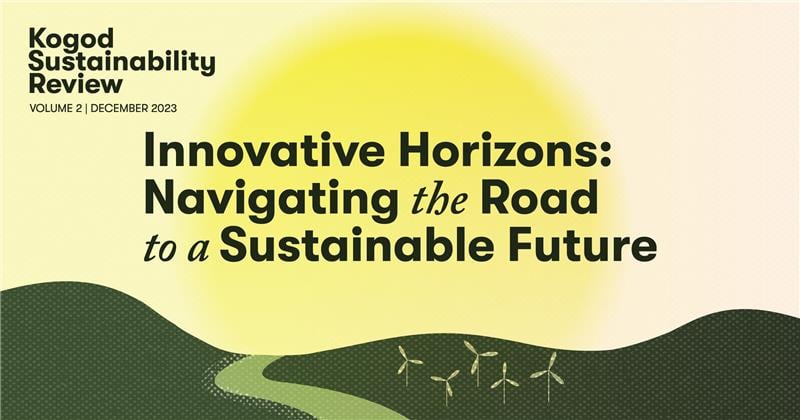
Dubem Abuah
MS in Sustainability Management Student, Kogod School of Business
"We won't have a society if we destroy the environment.” -Margaret Mead
In the contemporary era, as environmental concerns drive societies worldwide towards a sustainable future, the narrative unfolds as an intricate web of complexities, challenges, and sometimes contradictions. As nations grapple with environmental responsibilities, it is essential to recognize that the true meaning of sustainability transcends merely adopting green practices; it embodies a balance between environmental stewardship, economic growth, and social equity (Mayers). This balance is important, ensuring that our strides toward advancement preserve the Earth's vitality and promote the welfare of all people now and in the future.
Historically, industrialized nations reaped immense benefits from the unchecked use of fossil fuels which served as an immense source of power during the Industrial Revolution. This trajectory propelled Western economies into affluence and technological advancement, setting a precedent for nations that followed. But with this progress came significant pitfalls—climate change, environmental degradation, and a rapidly dwindling pool of natural resources. The scars of deforestation, ozone layer depletion, and rampant pollution serve as grim reminders of industrialization's unchecked pace (Jain).
Today, the baton of sustainable growth has been passed to emerging economies. These nations are met with the implicit expectation of avoiding the environmental missteps of their predecessors. This is not merely an ethical imperative but also stems from the real-world impacts of climate change, affecting agriculture, health, and overall living conditions in these regions (Rajgopal).
Emerging nations, aspiring for modern infrastructure and elevated living standards, face a pivotal question. Can they genuinely leapfrog stages of industrial development that historically caused much environmental damage? The challenge lies in balancing rapid development with sustainable practices, a task not as straightforward as it seems (Meidl). The introduction of green technologies like solar and wind energy, while commendable, requires substantial investments and a shift in traditional energy infrastructures.
Challenges in Implementing Sustainability Solutions
In industries like fashion and consumerism, the sustainability dialogue has occasionally been overshadowed by "greenwashing." As Street Trotter highlights, some industry players place branding above genuine eco-friendly initiatives (Street Trotter n.d.). Such superficial commitments dilute genuine efforts and sow seeds of scepticism among consumers, making them question the authenticity of broader sustainability campaigns.
Beyond industries, urban planning is another critical area where sustainability plays a pivotal role. As cities swell and urban areas expand, sustainable city planning becomes indispensable to cater to the increased housing demand and the need to minimize environmental impact, while supporting a growing population. From waste management to transportation and infrastructure, the need for green solutions is palpable (Farri et al.).
While the idea of reusing, recycling, and reducing waste is commendable, it's crucial to ensure that the processes involved are genuinely sustainable."

Dubem Abuah
MS in Sustainability Management Student, Kogod School of Business
A Holistic Approach to a Shared Future
The concept of a 'circular economy' (an economic system aimed at eliminating waste and the continual use of resources), noble in its intent, requires more in-depth exploration. While the idea of reusing, recycling, and reducing waste is commendable, it is crucial to ensure that the processes involved are genuinely sustainable and aim to reduce the impact on the environment. For instance, the recycling of certain materials might consume more energy than it saves, presenting a paradox in what is deemed 'sustainable' (Meidl 2).
Insights from Harvard Business Review emphasize the importance of an integrated approach. By overly concentrating on individual metrics—like reducing one’s carbon footprint—we might inadvertently neglect other significant environmental or societal aspects such as social equity, economic inclusion, and community resilience. True sustainability needs a comprehensive view, considering the intricate interplay of ecological, economic, and social systems (Mayers, Davis, and Van Wassenhove).
As nations navigate the complex terrain of how to scale and implement sustainability solutions, international cooperation emerges as a linchpin for success. Developed nations can play a pivotal role by aiding emerging economies through technology transfers, funding, and collaborative research. Joint efforts can bridge knowledge and resource gaps, fostering a more cohesive global approach to sustainability (Rajgopal).
In this global effort, every step, no matter how small, should bring us closer to a future that's not just sustainable, but also equitable and prosperous for all."

Dubem Abuah
MS in Sustainability Management Student, Kogod School of Business
In conclusion, the journey to sustainability is neither linear nor straightforward. It is a mosaic of efforts, challenges, innovations, and collaborations. While the path is fraught with complexities, the collective responsibility of nations provides a beacon of hope, as it combines global resources and expertise to more effectively address sustainability challenges and support equitable progress.
As we navigate this journey, it is pivotal to ensure that our endeavors are genuinely inclusive of all nations, especially those most vulnerable, ensuring that environmental preservation seamlessly aligns with the progress of nations and the well-being of all inhabitants. In this global effort, every step, no matter how small, should bring us closer to a future that is not just sustainable but also equitable and prosperous for all.
Citations
Jain, Naveen. “Sustainability is Actually Not Sustainable.” Quartz, 23 Oct. 2018, https://www.qz.com/1433016/sustainability-is-actually-not-sustainable.
Dev, Avinandita. “Why the Fashion Industry’s Sustainability Efforts are Not Enough.” Street Trotter, 10 Jan. 2020, https://www.streettrotter.com/fashion-2/sustainability-is-not-sustainable.
Rajgopal, Shivaram. “Investing in Sustainability for Emerging Markets.” Forbes, 1 Jan. 2022, https://www.forbes.com/sites/shivaramrajgopal/2022/01/01/investing-in-sustainability-for-emerging-markets.
Meidl, Rachael A. “A Circular Economy Does Not Necessarily Translate to Sustainability.” The Bakers Institute, Forbes, 3 Aug. 2021, https://www.forbes.com/sites/thebakersinstitute/2021/08/03/a-circular-economy-does-not-necessarily-translate-to-sustainability.
Mayers, Kieren, Tom Davis, and Luk N. Van Wassenhove. “The Limits of the Sustainable Economy.” Harvard Business Review, 16 June 2021, https://www.hbr.org/2021/06/the-limits-of-the-sustainable-economy.
Farri, Elisa, Paolo Cervini, and Gabriele Rosani. “How Sustainability Efforts Fall Apart.” Harvard Business Review, 26 Sept. 2022, https://www.hbr.org/2022/09/how-sustainability-efforts-fall-apart.
Meidl, Rachel. “Disentangling Circular Economy, Sustainability, and Waste Management Principles.” Issue Brief no. 07.29.21, Rice University’s Baker Institute for Public Policy, 29 July 2021, Houston, Texas.
